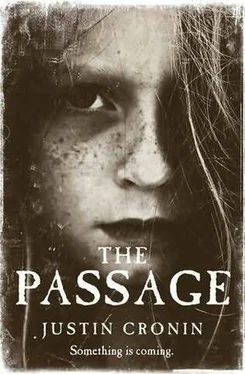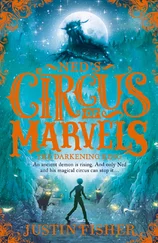She put the paper down and smiled at Lacey. “Good, you’re up. We’ve already had our breakfast, right, Amy?”
The little girl nodded, chewing. Before she’d joined the order, Sister Claire had sold houses in Seattle, and as Lacey took a place at the table, she saw what the sister had been reading: the real estate section. If Sister Arnette had seen this, she would have been annoyed, might even have given one of her impromptu speeches about the distractions of material life. But the clock on the stove said it was a little after eight; the other sisters would be next door at Mass. Lacey felt a stab of embarrassment. How could she have slept so late?
“I went to early services,” Claire said, as if answering her thoughts. Sister Claire often went to the 6:00 A.M. before her daily jog, which she referred to as a visit to “Our Lady of Endorphins.” Unlike the rest of the sisters, who had never been anything else, Claire had lived a whole life outside the order: been married, made money, owned things, like a condo and nice shoes and a Honda Accord. She hadn’t felt the call until she was in her late thirties and divorced from the man she once referred to as “the worst husband in the world.” Nobody knew the details except perhaps Sister Arnette, but Claire’s life was a source of wonder to Lacey. How was it possible for a person to have two lives, so very different from each other? Sometimes Claire would say something like “Those are cute shoes” or “The only real good hotel in Seattle is the Vintage Park,” and for a moment all the sisters would be stunned into a silence that was one part disapproval, one part envy. It was Claire who had gone to shop for Amy, the unstated implication being that she was the only one of them who really knew how to do this.
“If you hurry you can still make it to the eight o’clock,” Claire offered. Though of course it was too late; Claire’s real meaning, Lacey understood, was something else. “I can watch Amy.”
Lacey looked at the girl. Her hair was disordered from sleep, but her skin and eyes were bright, rested. Lacey ran the tips of her fingers through the girl’s bangs. “That’s very kind of you,” Lacey said. “Perhaps, today, just this once, because Amy is here-”
“Say no more,” Sister Claire said and, laughing, halted Lacey’s words with a hand. “I’ll cover for you.”
The looming day assembled in Lacey’s mind. Sitting at the table, she remembered her plan for the zoo. When did it open? What about the rain? It would be best, she thought, to be out of the house before the other sisters returned. Not only because they would wonder why she hadn’t come to Mass; they might also start to ask questions about Amy. The lie had worked so far, but Lacey felt its softness, like a floor of rotten boards beneath her feet.
When Amy had finished her waffles and a tall glass of milk, Lacey led her back upstairs and got her quickly into her clothes: a fresh pair of jeans, stiff with newness, and a T-shirt with the word SASSY stenciled on it, the letters outlined with sequins. Only Sister Claire would have possessed the courage to choose something like that. Sister Arnette wouldn’t like the shirt, not at all-if she saw it she’d probably sigh and shake her head as she always did, souring the air of the room-but Lacey knew the shirt was perfect, just the sort of thing a little girl would want to wear. The sequins made the shirt special, and surely that’s what God would want for a child like Amy: some happiness, however small. In the bathroom she wiped the syrup off Amy’s cheeks and brushed out her hair, and when this was done she dressed herself, in her usual pleated gray skirt and white shirt and veil. Outside, the rain had stopped; a warm, unhurried sun was gathering in the yard outside. The day would be hot, Lacey guessed, a blast of warmth sailing in from the south behind the cold front that had pushed rain over the house all night.
She had a little cash, enough for tickets and a treat, and the zoo, of course, was something they could walk to. They stepped outside, into air that had begun to swell with heat and the sweetness of wet grass. The bells of the church had begun to bong out the hour; Mass would be ending at any moment. She led Amy quickly through the garden gate, through the tart aroma of herbs, the rosemary and tarragon and basil that Sister Louise tended so carefully, into the park, where people were already gathering for the first warm day of spring, to taste the sun and feel it on their skin: young people with dogs and Frisbees, joggers plodding along the paths, families staking out shady tables and barbecue pits. The zoo stood at the north end of the park, flanked by a broad avenue that cleaved the neighborhood like a blade. On the far side, the big houses and wide, princely lawns of old Midtown were forgotten, replaced by shotgun shacks with broken-down porches and half-assembled cars melting into the packed-dirt yards. Young men floated up and down the streets like pigeons, roosting on this corner or that and then moving on, all of it benumbed with idleness and vaguely ominous. Lacey should have felt better about this neighborhood than she did, but the blacks who lived there were different from Lacey, who had never been poor, at least not in the same way. In Sierra Leone her father had worked for the ministry; her mother kept a car and driver for shopping trips to Freetown and the polo matches at the fairgrounds; one time they’d attended a party where the president himself had danced a waltz with her.
At the edge of the zoo the air changed, smelling of peanuts and animals. A line had already formed at the entrance. Lacey purchased their tickets, counting out her change to the penny, then took Amy’s hand again and led her through the turnstile. The little girl was wearing her backpack with Peter Rabbit inside; when Lacey had suggested that it could remain at the house, she had seen, quickly, in the flash of the girl’s eyes, that this wasn’t even a question. The bag was nothing she could leave.
“What do you want to see?” she asked. Twenty feet from the entrance, they found a kiosk with a large map, blocked out in colors for different habitats and species. A white couple was examining it, the man with a camera swinging from a lanyard around his neck, the woman gently pushing a stroller back and forth; the baby, buried in a mound of pink fabric, was asleep. The woman glanced at Lacey and regarded her, momentarily, with suspicion: what was a black nun doing with a little white girl? But then she smiled, a little too forcibly-a smile of apology, of retraction-and the couple moved away down the path.
Amy peered at the map. Lacey didn’t know if she could read, but there were pictures beside the words.
“I don’t know,” she said. “Bears?”
“What kind?”
The girl thought a moment, scanning the images. “Polar bears.” Her eyes warmed with anticipation as she spoke; the idea of the zoo, of seeing the animals, was something the two of them now shared. It was just as Lacey had hoped. As they’d stood there, more people had come through the gate; suddenly the zoo was humming with visitors. “Also zebras and elephants and monkeys.”
“Wonderful,” Lacey said, and smiled. “We will see them all.”
At a snack stand they bought a bag of peanuts and made their way into the zoo’s interior, its rich zone of sounds and smells. As they approached the polar bear tank they heard laughter and splashing and shouts of hilarious terror, a mixture of voices both young and old. Amy, who had been holding Lacey’s hand, released it suddenly and dashed ahead.
Lacey made her way between the shoulders of the people who had gathered at the bear tank. She found Amy standing with her face just inches from the glass that gave an underwater view of the bears’ habitat-a curious sight in the Memphis heat, with rocks painted to look like ice floes and a deep pool of Arctic blueness. Three bears were basking in the sun, lounging like gigantic rugs by a fire; a fourth was paddling in the water. While Amy and Lacey watched he swam right up to them and, fully submerged, bumped his nose on the glass. The people around her gasped; a jolt of pleasurable fear shot down Lacey’s spine, into her feet and fingertips. Amy reached out and touched the sweating glass, inches from the bear’s face. The bear opened his mouth, showing his pink tongue.
Читать дальше












